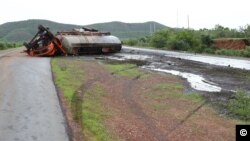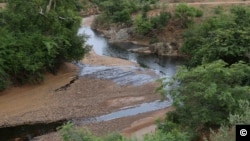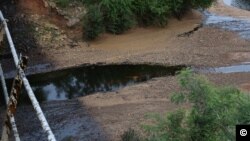ABUJA — Late Thursday in Zamfara State, Nigeria, a fuel tanker overturned in a road accident and poured its entire contents into a nearby river, potentially impacting the drinking water of millions of people in Zamfara and neighboring Sokoto state. Officials say they currently don't have the expertise or the equipment to clean up the oil and prevent another health disaster. Nigeria's Zamfara state is also known for being the site of the worst lead poisoning outbreak in modern history, which is an ongoing crisis.
When Mouktar Lugga, the environment commissioner for Zamfara State, arrived on the scene of the fuel spill Friday morning, he saw about ten men standing nearby. They were artisanal gold miners, a mainstay of the local economy. But with 33,000 liters of industrial fuel in the river they couldn't go to work.
Lugga says the tanker accident the previous night left oil slicks the size of two football fields on the river. He says Zamfara has neither the equipment nor the knowledge to clean up the spill and he is hoping the federal government will send technical experts to devise a clean-up plan.
At the moment, however, help does not appear to be on the way. Lugga says right now workers are trying to contain the spill by trying to block the river with sandbags, but the oily water continues to flow.
"It's really difficult because this is actually the rainy season so the river is flowing and we are more or less working against the tide," said Lugga.
The driver and one other person were injured in the accident, he says, but the potential long-term health and economic consequences are huge. Besides contaminating the drinking water and putting many artisanal gold miners out of work, the spill could also damage thousands of farms in Zamfara and Sokoto.
Nigeria's Doctors Without Borders head Ivan Gayton says people in the region already suffer from ill health after lead poisoning associated with artisanal gold mines killed hundreds of children and made many more sick. He says if the spill is not cleaned up it could mean another health disaster for Zamfara.
"It's just enormous in term of what it does to the water system and that can work its way up through the whole ecosystem," said Gayton. "Certainly a very small amount of petroleum oil can contaminate a huge amount of water. And water contaminated with oil is not good for your health at all."
The spill coincided with a separate incident in which almost 100 people died in a fire after another tanker tipped over in Nigeria's southern Niger Delta region. Locals rushed to gather the fuel as it spilled from the tanker and were killed in the inferno that followed.
When Mouktar Lugga, the environment commissioner for Zamfara State, arrived on the scene of the fuel spill Friday morning, he saw about ten men standing nearby. They were artisanal gold miners, a mainstay of the local economy. But with 33,000 liters of industrial fuel in the river they couldn't go to work.
Lugga says the tanker accident the previous night left oil slicks the size of two football fields on the river. He says Zamfara has neither the equipment nor the knowledge to clean up the spill and he is hoping the federal government will send technical experts to devise a clean-up plan.
At the moment, however, help does not appear to be on the way. Lugga says right now workers are trying to contain the spill by trying to block the river with sandbags, but the oily water continues to flow.
"It's really difficult because this is actually the rainy season so the river is flowing and we are more or less working against the tide," said Lugga.
The driver and one other person were injured in the accident, he says, but the potential long-term health and economic consequences are huge. Besides contaminating the drinking water and putting many artisanal gold miners out of work, the spill could also damage thousands of farms in Zamfara and Sokoto.
Nigeria's Doctors Without Borders head Ivan Gayton says people in the region already suffer from ill health after lead poisoning associated with artisanal gold mines killed hundreds of children and made many more sick. He says if the spill is not cleaned up it could mean another health disaster for Zamfara.
"It's just enormous in term of what it does to the water system and that can work its way up through the whole ecosystem," said Gayton. "Certainly a very small amount of petroleum oil can contaminate a huge amount of water. And water contaminated with oil is not good for your health at all."
The spill coincided with a separate incident in which almost 100 people died in a fire after another tanker tipped over in Nigeria's southern Niger Delta region. Locals rushed to gather the fuel as it spilled from the tanker and were killed in the inferno that followed.







